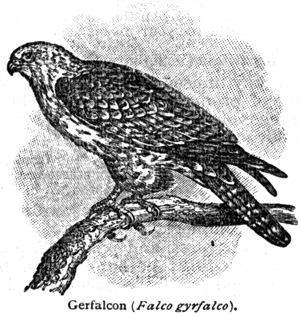Today’s word of the day is mell, meaning “to mix or to meddle,” of which it is a contracted form, and through which it is historically related to French, Spanish, and Italian words for “mix.” It is, of course, related to pell-mell.
Today’s word of the day is falx, something that is sickle-shaped, such as the poison fangs of a serpent, a metal implement (similar to a pruning hook), or, in anatomy, something which is falcate or falciform, both which mean “sickle-shaped” or “hooked.” Because of the bird’s sharp, hooked talons, falcon probably comes from the same root as falx.

Gerfalcon
Today’s word of the day is fascinator. Besides the obvious meaning of “one who or that which fascinates,” it also means “a woman’s head scarf.” As you can see by the sentence examples and the images of fascinators, they’re mostly decorative rather than functional, they’re often crocheted, knitted, or made of lace, and they are indeed rather fascinating.
Today’s word of the day is cacoethes, an irrational but irresistible motive for a belief or action. It is also spelled cacoëthes and it is pronounced /kahk-uh-EE-theez/. Cacoëthes loquendi is a mania for talking or a morbid desire for gossip or speechmaking. Cacoëthes scribendi is a morbid propensity for writing or an itch for authorship.
Today’s word of the day is preterist, a person who is largely interested only in the past. The root preter- is from the Latin praeter meaning “past” or “beyond.” Anyone who has studied grammar will recognize it in preterite, but it’s also found in preternatural ‘beyond what is normal or natural’ and preterhuman ‘beyond what is human.’